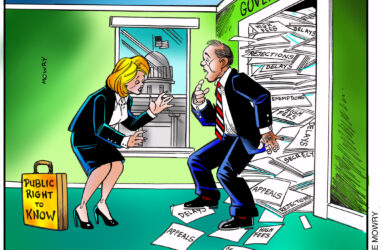
This week is National Newspaper Week, and we found this a fit opportunity to connect with our readers and offer insight as to how our newsroom operates on the inside.
We know last week’s article about the teacher misconduct report has been a contentious issue in the community. We’ve heard varying perspectives on the report – some good, some bad. A few have gone as far as condemning The Chronicle for reporting on it in the first place.
We can take it. We’ve got thick skin; you have to in this industry. But this seems like a perfect time to invite you into our world and offer a glimpse as to how news is made, what roles us journalists play in your community and why articles like last week’s are important to our democracy.
A journalist is the one person in the community who represents only the public interest. It is our job to give a voice to collective concerns. What you read last week is a direct reflection of that responsibility.
Sometimes we sniff out stories, other times they fall into our lap. This story came to us in a flurry of emails, phone calls and in random encounters with the public over the course of several weeks.
The first concerned phone call came in August, then emails from others followed. A week or two later, another parent stopped me while I was in Eugene. Realizing I work at The Chronicle, her eyes widened and she, too, urged me to look into the issue. It quickly became apparent that was there was a web of concern spanning more than one or two disgruntled people.
So, we looked into it, because that’s what we do.
What we found was a network of around 30 parents upset over two issues. The first issue was the contents of the Teachers Standards Practices Commission report, and the second issue was district administration’s seemingly ongoing technique of withholding information from the public.
These parents felt unheard. They felt filibustered by the district when their concerns were not acknowledged. They felt they had no say in what goes on in the schools they send their kids to.
Mostly, they’ve just had enough.
The district administration has cultivated an atmosphere of mistrust by not being forthcoming with their previous faux pas, and whether you like it or not, people are on edge about it.
It all culminates.
They feel whiplashed from scandal after scandal being churned out of Creswell School District and are angry they are the last ones to know about issues in their own district – if they are even told at all.
They believe in their right to know, and so do we. That narrative is a really big deal to watchdogs like us. We believe in government accountability. The fact that this article has spurred such public discourse in-and-of itself demonstrates that it is a topic that needs to be discussed.
What the public doesn’t see is all the legwork that goes into writing an article of this caliber to ensure it is ethical and accurate.
Since August, I’ve consulted with several professional journalists; conferred with our newspaper attorney; relentlessly begged for weeks for the anonymous sources to go on record; reached out to district administration several times; spent hours talking on the phone and emailing parents and staff and read hundreds of pages on ethics. We even pulled the story last minute – which was originally slated to run a week prior – to try and convince others to speak up about the issue before it went to print.
When that article didn’t print on Sept. 27 as originally planned, we received more phone calls and drop-ins, wondering where the article was. This time, we got to hear from staff and their concerns. Hearing the staff’s perception from the inside solidified the need for the story even more.
When I asked a staff member to surmise what the general reaction of their fellow staff members would be once that article hit the newsstands, they said there would be ”a huge sigh of relief” among staff members, because, finally, they could openly talk about it. The parents felt the same way.
There is a constant monitoring of one’s moral compass when writing a story like this. I feel it all the way down to my bones.
And yes, I have considered that a story like this could ”ruin someone’s life,” and no, I absolutely do not feel good about it. I have certainly had my fair share of sleepless nights, appetite loss and anxiety attacks as I waded through this story. Still do.
But it’s part of the job. We address community concerns – not to damage the community, but to bring light to its underbelly so that things might change for the better, and so those unheard voices have the chance to be heard.
At the end of the day, we are just doing what newspapers do: we stand up for the public, give a voice to the voiceless, encourage civic dialogue and hold those with power accountable.
People think the media gets their jollies from exposing a story such of this, but this is not a ”their pain is our gain” situation. Maintaining journalistic principles does not mean we ignore the pain someone might be going through.
There is no joy in airing out someone’s dirty laundry. But that dirty laundry is public record, and should be kept in the public domain – especially if the public demands it be so.
Journalists are the vessel for which the public can have their voices heard, and it is up to you to decide what to do with the information.
Just because the school district is subject to occasional bad press, does not mean we discontinue the good press. I was in Creslane Friday morning – the morning after the story broke – taking photos of the students of the month. And I’ll be back again, and again. Bad press doesn’t negate all the good that comes from the district, all the wonderful teachers and staff that serve, protect and educate your children.
It’s not personal, it’s ethical. We are just doing our job, and we will continue on for the betterment of our community.







